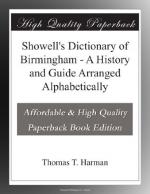That the inhabitants of Birmingham, so rapidly increasing in numbers and wealth, should be desirous of direct representation in the House of Commons, could be no wonder even to the most bigoted politicians of the last and early part of the present century. Possibly, had there been ’91 Riots, nor quite so much “tall talk,” the Legislature might have vouchsafed us a share in the manufacture of our country’s laws a little earlier than they did, and the attempt to force a member through the doors of the House could not have added to any desire that may have existed in the minds of the gentlemen inside to admit the representative of Birmingham. The Newhall Hill meeting of July 12th, 1819, may be reckoned as the first pitched battle between the invaders and defenders of the then existing Parliamentary Constitution. The appointment of Sir Charles Wolesey as “Legislatorial Attorney and Representative,” with instructions to take his seat as M.P. for the town (and many so styled him), even though made at a meeting of 20,000 would-be electors, does not appear to have been the wisest way to have gone to work, notwithstanding the fact that Sir Charles himself said he had no doubt of their right to send him up as their Member. Prosecution of the leaders followed, as a matter of course, and if the twenty-and-odd-thousands of the local Conservative electors of to-day were thus to try to obtain their due share of representation in the House, most likely the leaders of such a movement would be as liberally dealt with. The “battle of freedom,” as the great Reform movement came to be called, has often been described, and honour been given to all who took part in it. The old soldiers of the campaign should be allowed, if they choose, to “fight their battles o’er again,” as long as they live, but it is about time that the hatchet of party spite, (hitherto so freely used in local political warfare) was buried out of sight, and all sides be as willing to give equal rights as their fathers were to fight for theirs. Birmingham, however, was not without some friends in Parliament, and on the occasion of the disfranchisement of the borough of East Retford in 1827, it was proposed by Mr. Charles Tennyson that the two seats thus voided should be given to Birmingham. Mr. George Attwood was High Bailiff at the time, and he at once called a public meeting to support Mr. Tennyson’s proposition by petition. The Public Office was not large enough for those who attended the meeting (June 22, 1827) and they adjourned to Beardsworth’s Repository, where speeches were delivered by the leading men of all parties. Petitions to both Houses were drawn up and signed, the county members, Dugdale Stratford Dugdale and Francis Lawley, Esqrs., being asked to introduce the one to the House of Commons, and Lord Dudley and Ward (Baron of Birmingham) and Lord Calthorpe to support the petitioners’ prayer in the Upper House. Mr. Tennyson (who afterwards took the




